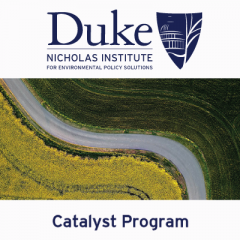
The Nicholas Institute for Environmental Policy Solutions at Duke University has awarded funding to six research projects for Fiscal Year 2019–20 through the institute's Catalyst Program.*
Now in its third year, the Catalyst Program aims to build on the Nicholas Institute’s mission by increasing engagement with Duke faculty to incubate and advance new partnerships, enhance policy-relevant knowledge, and create innovative policy solutions based on new creative synergies.
The 2019–20 awardees are:
Green, Healthy, and Affordable Housing for Resilient Communities
This pre-catalyst planning grant will be used to build a team that will design a project to explore and propose policy solutions to two converging crises: affordable housing and climate change. The larger project will focus on creation of specific policy proposals and transactional models for green, healthy, and affordable housing for homeowners and renters in low-income/materially poor communities.
Collaborators: Kate Konschnik, Nicholas Institute for Environmental Policy Solutions; Ryke Longest, Environmental Law and Policy Clinic; Andrew Foster, Duke School of Law; Paige Gentry, Klein Hornig LLP.
ClimateCAP – The Nexus of Climate, Capital and Business in China
In March 2018, Fuqua EDGE organized and hosted a successful event called ClimateCAP: The Global MBA Summit on Climate, Capital & Business — in partnership with 15 other top-tier business schools from the U.S. and Europe — to educate graduate business students about the business implications of climate change. This pre-catalyst grant will be used to explore the potential to hold the 2021 ClimateCAP Summit at Duke Kunshan University (DKU) in partnership with the DKU Environmental Research Center. This effort supports a wider project to enhance Chinese private sector actions to address climate change.
Collaborators: Jackson Ewing, Nicholas Institute for Environmental Policy Solutions and the Sanford School of Public Policy; Kathinka Furst, Duke Kunshan University Environmental Research Center; Dan Vermeer, Fuqua Center for Energy, Development, and the Global Environment.
Catalyzing New Collaborations on Social & Environmental Determinants of Health in Durham, N.C.
This project will bring together the expertise at the School of Medicine with the environmental policy expertise at the Nicholas Institute to develop policy-relevant, applied-research projects that evaluate approaches to address longitudinal changes in health outcomes due to dynamic environmental processes within neighborhoods. It will also seek to combine this work with a developing collaboration on housing security to assess children’s health and educational outcomes.
Collaborators: Nrupen Bhavsar, Department of Medicine, General Internal Medicine; Kay Jowers, Nicholas Institute for Environmental Policy Solutions; Laura Richman, Department of Population Health Sciences; Christopher Timmins, Economics Department.
HighSeas @ Duke
The open ocean is facing rapid industrialization through traditional uses, such as fishing and shipping, and areas of growth including deep-sea mining, offshore aquaculture, offshore energy development, and communications infrastructure that together drive the emerging "Blue Economy." The management and governance of resources in marine areas beyond national jurisdiction is an urgent focus of the international community. This project will develop the strategic foundation for Duke University researchers to become the premiere academic resource for high seas ocean governance.
Collaborators: Daniel Dunn, Nicholas School of the Environment; John Virdin and Katie Latanich, Nicholas Institute for Environmental Policy Solutions; Steve Roady, Duke School of Law and Nicholas Institute for Environmental Policy Solutions.
Artisanal Gold Mining Intervention Assessment
Artisanal and small-scale gold mining (ASGM) is an informal, non-mechanized economic sector in typically rural areas of more than 70 countries around the world. ASGM is the largest global source of mercury to the environment, and the practice is a leading cause of deforestation and biodiversity loss in countries where it takes place. This project will aggregate knowledge of the underlying dynamics of ASGM and identify and compare interventions that can address various impacts of gold mining to inform current funding priorities and next steps in scientific research and policy integration.
Collaborators: Bill Pan, Duke Global Health Institute and Nicholas School of the Environment; Alex Pfaff, Sanford School of Public Policy, Nicholas School of the Environment, and Economics Department; Lydia Olander and Elizabeth Losos, Nicholas Institute for Environmental Policy Solutions.
Marine Medicine: Multidisciplinary Research at the Nexus of the Environment and Human Health
Plastics make up more than 10 percent of human waste. Much of these plastics end up in the ocean, where they can be ingested by fish, birds, and other marine species. With the staggering volume of plastic debris produced annually and clear environmental and potential human health impacts, there is an urgent need to develop novel strategies to combat plastics bioaccumulation. Funding from this pre-catalyst grant will provide students with summer internships through the Duke Scholars in Marine Medicine Program to work on a research project investigating how new pollutants and new technology to remediate these pollutants interface with public policy decisions.
Collaborators: Jason Somarelli, Department of Medicine and Duke Comparative Oncology Group; Steve Roady, Duke Law School and Nicholas Institute for Environmental Policy Solutions; Meagan Dunphy-Daly and Richard Di Giulio, Nicholas School of the Environment; Daniel Rittschof, Andrew Read, and Thomas Schultz, Nicholas School of the Environment and Duke Marine Laboratory; William Eward, Department of Orthopaedics and Duke Comparative Oncology Group
* NOTE: Funding for the Marine Medicine pre-catalyst grant was awarded on June 13, 2019.





